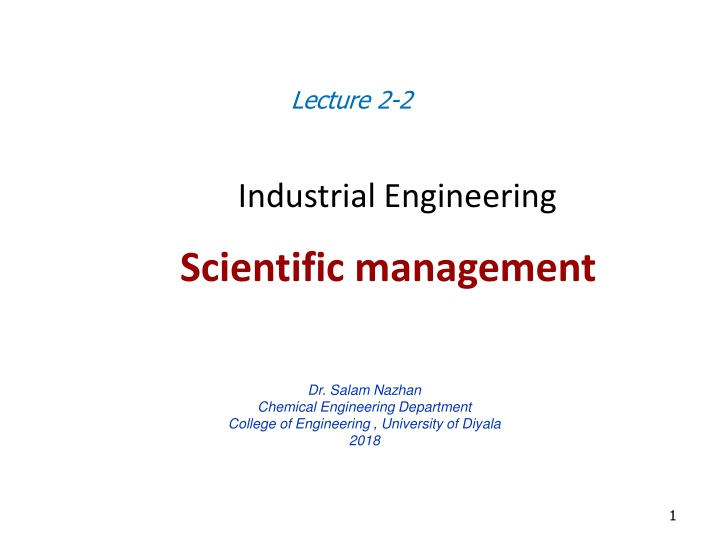
Scientific Management Techniques in Industrial Engineering
Explore the techniques of scientific management in industrial engineering, covering time study, fatigue analysis, standardization of tools, scientific task setting, wage rate setting, selection and training processes, functional foremanship, and the advantages of applying scientific management principles.
Download Presentation

Please find below an Image/Link to download the presentation.
The content on the website is provided AS IS for your information and personal use only. It may not be sold, licensed, or shared on other websites without obtaining consent from the author. If you encounter any issues during the download, it is possible that the publisher has removed the file from their server.
You are allowed to download the files provided on this website for personal or commercial use, subject to the condition that they are used lawfully. All files are the property of their respective owners.
The content on the website is provided AS IS for your information and personal use only. It may not be sold, licensed, or shared on other websites without obtaining consent from the author.
E N D
Presentation Transcript
Lecture 2-2 Industrial Engineering Scientific management Dr. Salam Nazhan Chemical Engineering Department College of Engineering , University of Diyala 2018 1
Techniques of Scientific Management Time study or work measurement Time study is the technique of observing and recording the time required by worker to complete a work. Fatigue Study Fatigue, physical or mental, has an adverse effect on the workers health and efficiency. Fatigue is generally caused by long working hours without rest pauses, repetitive operations, excessive specialization, and poor working conditions. Purpose of fatigue study is to reduce fatigue at work and maintains the operational efficiency of workers. 2
Techniques of Scientific Management [2]Standardization of tools and equipment Efforts should be made to provide standardized working environment and methods of production to the workers. Standardization would help to reduce spoilage and worker of materials, improve quality of work, reduce cost of production and fatigue among the workers. [3] Scientific tasks setting: It is essential to set the standard task which an average worker should do during a working day. Taylor called it a fair day s work [4] Scientific setting of wage rates: Taylor suggested differential piece wage system. Under this system, higher rates are offered to those workers, who produce more than the standard quantity. Taylor was of the view that the efficient workers should be paid from 30% to 100% more than the average workers 3
Techniques of Scientific Management [5] Scientific selection and training Management should design scientific selection procedure so that right men are selected for the right job. [6] Functional Foremanship Taylor advocated that specialization must be introduced in a factory. Functional foremanship is a form of organization which involves supervision of a worker by several specialist foremen. The purpose of it is to improve the quality of supervision. [7] Differential Piece-rate plan Taylor suggested this plan to attract highly efficient workers. Under this system, there are two piece work rates, one is lower and another is higher. The standard of efficiency is determined in terms of number of units during a day or standard time. The worker who produces more than standard output with is the standard time; he will be given higher piece rate. On the other hand, if a worker is below the standard, he had been give lower rate of wages. This slow worker is this penalized as he gets wage at a lower piece rate. 4
Advantages of scientific management 1- Contribution to organizational goals 2- Efficient use of resources 3- Employees feel motivated while performing their duties and work 4- Judging accuracy of standard 5- Better results 6- Facilitates coordination of the activities of various units 7- It insists on continuous check on the employees and thus creates an atmosphere of order and discipline. 5
Advantages of scientific management 8- It helps in building high morale of the employees. 9- It facilitates decision making 10- It facilities delegation and decentralization of authority 11- It is forward looking 12- It is continuous process 13- Communication with the subordinates. 6
Disadvantages of scientific management 1- Difficulty in setting standard for product, process and quality. 2- Lack of control on external factors 3- Costly process 4- Time consuming 5- Difficulty in fixing responsibility 6- Difficulty is measurement of actual performance 7- It puts enterprise activities in a rigid framework. Commitment to rules, policies and procedures compel manages to be rigid and inflexible. 8- Time and motion study are not done by many industrial organization. 9- Differential piece rate system is opposed by workers and trade unions. 7
Example 8
References Introduction to Industrial Engineering, by Z. Max Shen Industrial Engineering, by N. J. Manck Industrial Management, by Shiv Jhalani Reference Books: 1. Management by Knootz. 2. Management by Griffin. 3. Management theory and Practices by JS Chandan.
